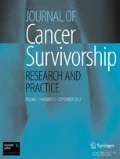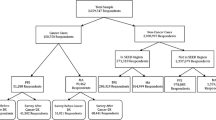Abstract
Purpose
Patient-generated health data (PGHD) can provide information about population-level patterns in health outcomes that patients experience during cancer survivorship. Cancer registries do not collect PGHD as part of routine operations. This study assessed the feasibility of online collection of PGHD to augment cancer registry data.
Methods
Cancer survivors who (1) were aged 50 or older, (2) had been diagnosed with breast, prostate, or colorectal cancer, and (3) received their diagnosis within 10 years of the study start date were recruited at four Surveillance, Epidemiology, and End Results (SEER) cancer registry program sites. Each site was required to collect PGHD at baseline and a future time point to assess the feasibility of longitudinal methods. All sites collected data through a survey or questionnaire(s); each site employed unique methods to administer their surveys.
Results
Across the sites, initial recruitment appeared to be the most challenging aspect in establishing a longitudinal cohort from the SEER sampling frame, with participation rates ranging from 3 to 17%. However, once enrolled, the percentage of survivors completing surveys at multiple time points was relatively high, ranging from 48 to 91%.
Conclusion
Augmenting cancer registry data with longitudinally collected PGHD is feasible, although more work is needed to overcome barriers of initial patient recruitment and adoption of online PGHD collection techniques for public health surveillance.
Implications for Cancer Survivors
Registry data, including PGHD, can provide the medical community with patient perspectives on treatment effects and quality of life and can offer cancer survivors information about symptom management and advances in research.
Similar content being viewed by others

References
Bluethmann SM, Mariotto AB, Rowland JH. Anticipating the “silver tsunami”: prevalence trajectories and comorbidity burden among older cancer survivors in the United States. Cancer Epidemiol Biomarkers Prev. 2016;25(7):1029–36.
Keating NL, Norredam M, Landrum MB, et al. Physical and mental health status of older long-term cancer survivors. J Am Geriatr Soc. 2005;53(12):2145–52.
Jacobs JM, Ream ME, Pensak N, et al. Patient experiences with oral chemotherapy: adherence, symptoms, and quality of life. J Natl Compr Cancer Netw. 2019;17(3):221–8.
Thong MS, Mols F, Stein KD, et al. Population-based cancer registries for quality-of-life research: a work-in-progress resource for survivorship studies? Cancer. 2013;119(Suppl 11):2109–23.
The Office of the National Coordinator for Health Information Technology. What are patient-generated health data? 2018. https://www.healthit.gov/topic/otherhot-topics/what-are-patient-generated-health-data. Accessed 3 May 2019.
Shapiro M, Johnston D, Wald J, et al. Patient-Generated Health Data. White Paper. RTI International. 2012. https://www.rti.org/publication/patient-generated-health-data-white-paper. Accessed 30 April 2020.
President’s Cancer Panel. Improving cancer-related outcomes with connected health. The National Cancer Institute. 2016. https://prescancerpanel.cancer.gov/report/connectedhealth/. Accessed 30 April 2020.
Shiffman S, Stone AA, Hufford MR. Ecological momentary assessment. Annu Rev Clin Psychol. 2008;4:1–32.
Dillman DA, Smyth JD, Christian LM. Internet, mail, and mixed-mode surveys: the tailored design method. 3rd ed. Hoboken: Wiley & Sons; 2009.
Hesse BW, Moser RP, Rutten LF. Surveys of physicians and electronic health information. N Engl J Med. 2010;362(9):859–60.
Backonja U, Haynes SC, Kim KK. Data visualizations to support health practitioners’ provision of personalized care for patients with cancer and multiple chronic conditions: user-centered design study. JMIR Hum Factors. 2018;5(4):e11826.
Acknowledgments
We thank Dr. Salma Shariff-Marco (University of California San Francisco), Dr. Edward Peters (Louisiana State University Health Sciences Center), Dr. Elizabeth Chrischilles (University of Iowa), and Dr. Felicity Harper (Wayne State University) and their study teams for the participation on the patient-generated health data project to enhance Surveillance, Epidemiology, and End Results (SEER) data collection. We also thank colleagues in the SEER program at the National Cancer Institute for their interest in promoting this emerging area of research.
Funding
This study was funded by the National Cancer Institute under contract HHSN261201300011I.
Author information
Authors and Affiliations
Contributions
Kristen N. Mangold: formal analysis, writing–original draft, writing–review and editing, and project administration. Lisa Gallicchio: formal analysis, writing–original draft, and writing–review and editing. Anna Gaysynsky: conceptualization, and writing–review and editing. Erin E. Kent: writing–original draft, and writing–review and editing. Kristen Constantine: writing–review and editing and data curation. Bradford W. Hesse: conceptualization, writing–original draft, and writing–review and editing.
Corresponding author
Ethics declarations
Conflict of interest
The authors declare that they have no conflict of interest.
Additional information
Publisher’s note
Springer Nature remains neutral with regard to jurisdictional claims in published maps and institutional affiliations.
Supplementary Information
ESM 1
(DOCX 29.8 kb)
Rights and permissions
About this article
Cite this article
Mangold, K.N., Gallicchio, L., Gaysynsky, A. et al. Feasibility of collecting patient-generated health data to enhance cancer registry surveillance. J Cancer Surviv 15, 785–791 (2021). https://doi.org/10.1007/s11764-020-00970-z
Received:
Accepted:
Published:
Issue Date:
DOI: https://doi.org/10.1007/s11764-020-00970-z



